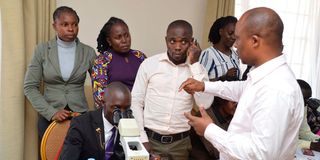Lab technicians gain fresh skills to fight malaria

Stephen Munene (right), a course facilitator at the African Medical and Research Foundation, takes Laboratory technicians from Busia and Siaya counties through a training session on parasite morphology in Nakuru on October 22, 2024.
What you need to know:
- The quality of a malaria test is crucial for optimal patient treatment and care.
For Peter Ochieng, a medical laboratory technician working at Nyangu Dispensary in Ugenya sub-county, Siaya County, his biggest worry is making a wrong malaria diagnostic analysis.
Coming from a malaria-endemic county, the quality of a malaria test is crucial for optimal patient treatment and care.
According to the Ministry of Health, malaria is the leading cause of illness and death in Siaya County.
In 2020, 546 out of every 1,000 people in the county were infected with malaria, requiring approximately more than Sh200 million worth of medicine for treatment, states the World Health Organisation (WHO).
Further, a 2021 cross-sectional survey revealed that malaria positivity rate in Siaya was 32 per cent, and it was one of the counties in Western Kenya with a high transmission rate.
After attending a refresher training programme on competencies and skills in malaria diagnosis for laboratory technicians from private and public hospitals in Siaya and Busia counties recently, Peter confided that it was a game changer.
“Coming from a county with a high prevalence of malaria, I appreciate the training sponsored by the African Medical and Research Foundation (Amref Africa). From this training, I realised I was missing malaria parasites in my diagnostic analysis. That means a lot of my patients were going home with the wrong results. Patients who needed to go home with medicines went empty-handed. I am now confident that going forward, I will be able to identify all the parasites,” he said.
The training took place in Nakuru.
“One key skill that I will make good use of is species identification of various malaria parasites. Initially, I reported only the two parasites I knew of. I will now be reporting more parasites.”
Francisca Opechuku, a laboratory technologist at Ukwala Sub-county Hospital in Siaya, said malaria is endemic in the county and mostly affects children.
“I will now be able to make correct diagnostic analysis for children and adults who visit the facility. From this training, it is now clear that the skills I gained in college are not enough for me to identify malaria strains.
“In college, I was never taught about species identification and counting. I was only taught about one strain of plasmodium that is common in Siaya. But now I know the morphology of other parasites like vivax,” said Francisca.
Maureen Angote, a medical laboratory officer who works at Bumala A Community Health Centre in Butula Sub-county, Busia County, agreed that the refresher course was critical.
Busia County is a malaria-endemic area with a prevalence of 39 per cent, which is higher than the national rate of 19 per cent. The county's proximity to Lake Victoria and other water bodies creates conditions that are ideal for mosquitoes to breed.
Warm temperatures and high humidity, especially during rainy seasons, contribute to the high burden of illness and mortality.
“I have learnt new skills to identify malaria parasites, identify species and quantify parasites accurately, and this will lead to prescribing the right medication,” said Maureen.
“Now I know how to identify plasmodium falciparum, which is a difficult parasite to identify, and it is the deadliest species that can cause cerebral malaria,” she added.
Medical experts say diagnostic errors are common causes of wrong treatment, delayed treatment and poor health outcomes.
Daniel Maloba, a senior medical laboratory officer at Onyango Sub-county Hospital in Busia, said the training was timely.
He said he deals with three species of malaria strains - plasmodium falciparum, plasmodium malariae and plasmodium ovale.
“Although I have never encountered plasmodium vivax strain, which is found mostly in Marsabit County, the training was an eye opener. Now I am able to distinguish between plasmodium ovale and plasmodium vivax, which have very close distinctive features,” said Daniel.
Daniel said he plans to pass on the knowledge he gained to his junior officers by conducting quality laboratory training at level three and four hospitals in Busia County.
According to the Ministry of Health, Busia County has achieved a significant reduction in malaria cases, decreasing from 763 for every 1,000 people in December 2023 to 517 for every 1,000 in June 2024.
Stephen Munene from AMREF Health Africa said the non-governmental organisation is keen on supporting laboratory training and competency assessments among laboratory officers in collaboration with the national malaria programme and reference laboratories.
“Our aim as AMREF Health Africa is to impart skills and knowledge to laboratory officers in both public and private hospitals,” he said.
He said the one-week training was crucial as it supplemented the knowledge the lab officers gained in the various training institutions they attended.
“Most of them have been learning on the job and don’t have enough exposure to reduce cases of laboratory diagnostic errors, and this refresher training was a good opportunity for them to get the latest skills in the profession. They now have a better attitude towards malaria detection.”
He added that diagnostic errors can be life-threatening.
A diagnostic error is one where a wrong laboratory result is given to a patient.
It can also be defined as a laboratory result that does not meet expectations in terms of accuracy, timeliness, or interpretation or does not reflect what is happening in the patient.
A wrong result can be due to a mistake happening at the time of sample collection, identification at the laboratories and during measurement of the sample, or when recording and communicating the patient's result.


